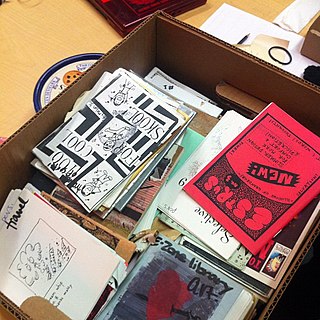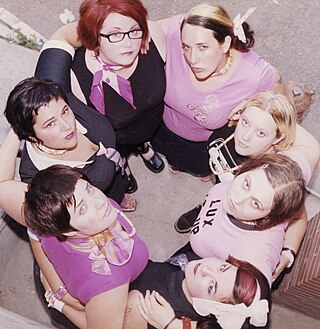
"Do it yourself" ("DIY") is the method of building, modifying, or repairing things by oneself without the direct aid of professionals or certified experts. Academic research has described DIY as behaviors where "individuals use raw and semi-raw materials and parts to produce, transform, or reconstruct material possessions, including those drawn from the natural environment ". DIY behavior can be triggered by various motivations previously categorized as marketplace motivations, and identity enhancement.

A zine is a small-circulation self-published work of original or appropriated texts and images, usually reproduced via a copy machine. Zines are the product of either a single person or of a very small group, and are popularly photocopied into physical prints for circulation. A fanzine is a non-professional and non-official publication produced by enthusiasts of a particular cultural phenomenon for the pleasure of others who share their interest. The term was coined in an October 1940 science fiction fanzine by Russ Chauvenet and popularized within science fiction fandom, entering the Oxford English Dictionary in 1949.

Sexual objectification is the act of treating a person solely as an object of sexual desire. Objectification more broadly means treating a person as a commodity or an object without regard to their personality or dignity. Objectification is most commonly examined at the level of a society, but can also refer to the behavior of individuals and is a type of dehumanization.

A punk zine is a zine related to the punk subculture and hardcore punk music genre. Often primitively or casually produced, they feature punk literature, such as social commentary, punk poetry, news, gossip, music reviews and articles about punk rock bands or regional punk scenes.

Third-wave feminism is a feminist movement that began in the early 1990s, prominent in the decades prior to the fourth wave. Grounded in the civil-rights advances of the second wave, Gen X third-wave feminists born in the 1960s and 1970s embraced diversity and individualism in women, and sought to redefine what it meant to be a feminist. The third wave saw the emergence of new feminist currents and theories, such as intersectionality, sex positivity, vegetarian ecofeminism, transfeminism, and postmodern feminism. According to feminist scholar Elizabeth Evans, the "confusion surrounding what constitutes third-wave feminism is in some respects its defining feature."
Girl power is a slogan that encourages and celebrates women's empowerment, independence, confidence and strength. The slogan's invention is credited to the US punk band Bikini Kill, who published a zine called Bikini Kill #2: Girl Power in 1991. It was then popularized in the mainstream by the British girl group Spice Girls in the mid-1990s. According to Rolling Stone magazine, the Spice Girls' usage of "girl power" was one of the defining cultural touchstones that shaped the Millennial generation, particularly during their childhood in the 1990s. However, since the maturing of older Millenials in the late 2000s, it has increasingly been dropped in favor of challenging real-world sexism that has become mainstream as of Generation Z's maturing of the 2020s.

Bitch was an independent, quarterly alternative magazine published in Portland, Oregon. Its tagline described it as a "feminist response to pop culture", and it was described in 2008 by Columbia Journalism Review as "a respected journal of cultural discourse". As a feminist publication, it took an intersectional approach.

Debbie Stoller is a New York Times best-selling American author, publisher, feminist commentator and knitting expert whose work includes magazines as well as books. She lives in Brooklyn, New York City. Stoller is the co-founder, co-owner and editor-in-chief of the culture magazine BUST, which she and Marcelle Karp launched in 1993.
Marcelle Karp, a.k.a. Betty Boob,, is an American feminist writer, editor, and television director and producer.
Lipstick feminism is a variety of feminism that seeks to embrace traditional concepts of femininity, including the sexual power of women, alongside traditional feminist ideas. The concept emerged within the third-wave as a response to ideals created by previous movements, where women felt that they could not both be feminine and a feminist.
Sexualization is the emphasis of the sexual nature of a behavior or person. Sexualization is linked to sexual objectification, treating a person solely as an object of sexual desire. According to the American Psychological Association, sexualization occurs when "individuals are regarded as sex objects and evaluated in terms of their physical characteristics and sexiness." "In study after study, findings have indicated that women more often than men are portrayed in a sexual manner and are objectified. In addition, a narrow standard of physical beauty is heavily emphasized. These are the models of femininity presented for young girls to study and emulate."

Venus Zine was a quarterly internationally circulated magazine covering women in music, film, art, entertainment, literature, fashion, indie culture and DIY culture. It was published from 1995 through 2010.

Stitch 'n Bitch is a name that has been used to refer to social knitting groups since at least World War II. Before the slang term "Stitch 'n Bitch" was used, groups of women in the 1940s would join to knit and talk in organized Stitch and Bitch clubs. The term was further used in the 1980s as part of the book Social History of American Knitting by Anne Macdonald. It is partly due to the book's success that the modern day Stitch 'n Bitch knitting groups have emerged in cities around the world. The groups, mainly women, meet to knit, stitch and talk. Typically, attendees knit, though others crochet, and still others engage in cross-stitching, embroidery, and other needlecraft. Nowadays, the groups have been analyzed by scholars as expressions of resistance to major political, social and technological change in Western societies. However, political discussion is not unusual at these events, and at least some participants are proponents of progressive, liberal, and/or leftist social and political change. Furthermore, the term Stitch 'n Bitch is now used by women from across the globe to connect with others in the virtual space seeing as the term has re-emerged in a world where the public sphere is the cyberspace.
Chick flick is a slang term, for the film genre catered specifically to women's interests, and is marketed toward women demographics. They generally tend to appeal more to a younger female audience and deal mainly with love and romance. Although many types of films may be directed toward a female audience, the term "chick flick" is typically used only in reference to films that contain personal drama and emotion or themes that are relationship-based. Chick flicks often are released en masse around Valentine's Day.
Feminism has affected culture in many ways, and has famously been theorized in relation to culture by Angela McRobbie, Laura Mulvey and others. Timothy Laurie and Jessica Kean have argued that "one of [feminism's] most important innovations has been to seriously examine the ways women receive popular culture, given that so much pop culture is made by and for men." This is reflected in a variety of forms, including literature, music, film and other screen cultures.
Riot grrrl is an underground feminist punk movement that began during the early 1990s within the United States in Olympia, Washington and the greater Pacific Northwest and has expanded to at least 26 other countries. A subcultural movement that combines feminism, punk music, and politics, it is often associated with third-wave feminism, which is sometimes seen as having grown out of the riot grrrl movement and has recently been seen in fourth-wave feminist punk music that rose in the 2010s. The genre has also been described as coming out of indie rock, with the punk scene serving as an inspiration for a movement in which women could express anger, rage, and frustration, emotions considered socially acceptable for male songwriters but less commonly for women.

Susan J. Douglas is an American feminist columnist, and cultural critic who writes about gender issues, media criticism and American politics. She has published five books on American history, and is currently Catherine Neafie Kellogg Professor of communication studies at the University of Michigan at Ann Arbor.

Pretty Porky & Pissed Off(PPPO) was a Canadian fat activist and performance art collective based in Toronto, Ontario from 1996 to 2005. They used their bodies as modes of resistance against discriminatory language, cultural, social practices, and policies. Their feminist, queer, and LGBT politics were part of the DIY ethics of punk rock and the Riot Grrrl movement, and feminist activism. PPPO was a Canadian trailblazer in the international fat liberation movement.

Women have made significant contributions to punk rock music and its subculture since its inception in the 1970s. In contrast to the rock music and heavy metal scenes of the 1970s, which were dominated by men, the anarchic, counter-cultural mindset of the punk scene in mid-and-late 1970s encouraged women to participate. This participation played a role in the historical development of punk music, especially in the US and UK at that time, and continues to influence and enable future generations. Women have participated in the punk scene as lead singers, instrumentalists, as all-female bands, zine contributors and fashion designers.

Gurl.com was an American website for teenage girls that was online from 1996 to 2018. It was created by Rebecca Odes, Esther Drill, and Heather McDonald as a resource centered on teen advice, body image, female sexuality, and other teen-related concerns. First published as an online zine, it later expanded into an online community. At one point, it provided a free e-mail and web hosting service, known as Gurlmail and Gurlpages respectively.













